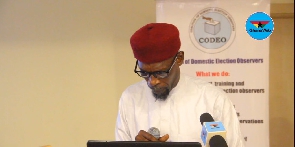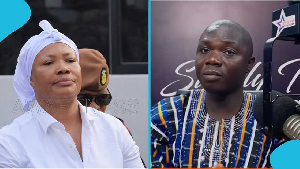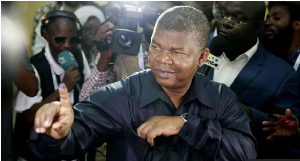The spokesperson of the National Chief Imam, Sheikh Armiyawo Shaibu has joined in the call for the passage of the Anti- LGBTQ+ bill in Ghana.
He said promoting LGBTQ is under the guise of human rights is very dangerous to society.
Sheikh Shaibu, who was speaking on Accra-based UTV, argued that promoting issues of gender and sexuality particularly, in schools, was deeply problematic.
“Now they are using cunning ways to capture their minds. A case in point, just some few years ago you heard something about the Comprehensive Sex Education. What they sought to do was that they were going to teach the children everything about sex education. However, if you saw something you were not pleased with, you couldn’t pass judgement.
“They said you should be objective, not be judgmental. It is such that in your mind, gender doesn’t even exist again. There is no longer he, she. Look this thing is dangerous,” he said.
To him, promoting LGBTQ+ is a fight against God’s family system which is the bond the holds society together.
“That is why I am saying that in my language, it is not about human right, it is about the damage is doing to God’s family system. That is the danger,” he continued.
Explaining further, Sheikh Armiyawo Shaibu indicated that the promoters of the LGBTQ+ are using the school’s curricular as a medium to teach children that they have the liberty to change their gender.
This, he believes, is dangerous.
“Now we are saying gender is a human construct, this we are teaching the children in their schools. First way, we will not allow anything about this kind of understanding into our curricular.
“Just imagine you give birth to a girl child then she comes home to tell you she feels she is a boy instead. So, she is going to the hospital for the doctor to change her into a boy, Charlie,” he continued.
Sheikh Shaibu also stressed that promoters of the LGBTQ+ should look beyond just academics and consider other threats it poses to the society especially in Ghana.
“Look, this thing we are dealing with; it worries me when we look at it only from academics. These are heavy academics who did not go beyond what it means to us. What it is going to do to the family which is the bond that holds society together,” Sheikh asked.
Meanwhile, the Country Director for Amnesty International, Genevieve Partington, called on Parliament to throw out completely the anti-LGBTQ Bill presented to the House for consideration and passage.
She argued that the bill infringes upon human rights even before its potential enactment.
Background
On July 5, 2023, the members of parliament convened to deliberate on the passage of the Promotion of Proper Human Sexual Rights and Ghanaian Family Values Bill.
On the floor, the proponents of the private members' bill argued to the house with reasons why the bill should be passed.
They argue that the bill when passed, will protect the culture and values of the Ghanaian people.
However, the country director for Amnesty International said that the bill infringes upon human rights even before its potential enactment.
“Parliament did a hearing on the anti-LGBTI Bill, so they adopted the report. The Bill hasn’t been passed yet but unfortunately, the bill abuses human rights. We must understand that LGBTI is a community; they are also human beings and for Amnesty International, we believe everyone deserves to have a right so far as they are not harming anyone.
“Now the bill currently criminalizes anyone up to 3 years or up to 5 years, even if you are even an ally of the LGBTI community. Basically, it means if you promote or support the LGBTI Community, you’ll be prosecuted, and you can go to jail. That means it can include academics, you, me, or anybody that supports the LGBTI Community,” she said.
Partington further argued that it is unjust to single out and criminalize a specific group based on their sexual orientation when they are not causing harm.
She underscored the importance of empathy and understanding, highlighting that various individuals coexist within Ghanaian society, representing diverse ages, religions, genders, and sexual orientations.
“Now we must understand that we need to be empathetic as a people of Ghana. Different people live among us; age, religion, there are Muslims, there are Christians, there are men and women. But they are people who live within these communities [LGBTI] and they are a vulnerable group because they have been singled out. I don’t think it’s right for anyone to make a law that singles out one group and criminalizes what they do,” she continued.
Furthermore, Partington emphasized that Ghana's Constitution prohibits the criminalization of individuals who are not causing harm, urging the public to carefully review the bill's details and amendments.
“We must understand that so far as they are not hurting anyone, it’s against our Constitution of Ghana to criminalize them. So, I plead with the public to please get a copy of the amendment and carefully read the details,”
“You know the parliamentarians will tell you otherwise that the bill in its current state is good and they have reviewed it but it’s not good. So, for Amnesty International, the way forward is the bill should be thrown out completely; it shouldn’t even exist. But because of democracy, we must discuss. So, I was happy that yesterday, there was a discussion, although I must admit I was disappointed in some of the parliamentarians for making the discussion a personal attack rather than an objective debate.
While Amnesty International advocates for the complete rejection of the bill, Partington acknowledged the democratic process and the need for discussion.
The country director expressed disappointment in some Parliamentarians who resorted to personal attacks on the minister for communication and digitalisation, Ursula Owusu-Ekuful during the debate.
“I think let’s be respectful. Hon Ursula Owusu-Ekuful was amazing. She gave very valid points; I thank her for that, but I feel her fellow MPs did not do well in personally attacking her. I think we should restrain from those kinds of personal attacks. Let’s have a healthy debate, there is no right or wrong. We can talk about it, and it is a democracy. Ghana, we need to vote at the end of the day. Parliament will vote on the Bill and hopefully, they will vote against it,” he added.
NW/OGB
Watch the latest episode of Everyday People on GhanaWeb TV below:
Share your news stories and ideas with GhanaWeb

To advertise with GhanaWeb

You can also watch this episode of People & Places here:
General News of Friday, 7 July 2023
Source: www.ghanaweb.com
LGBTQ is dangerous; it's not about human rights - Sheikh Armiyawo Shaibu
Opinions












